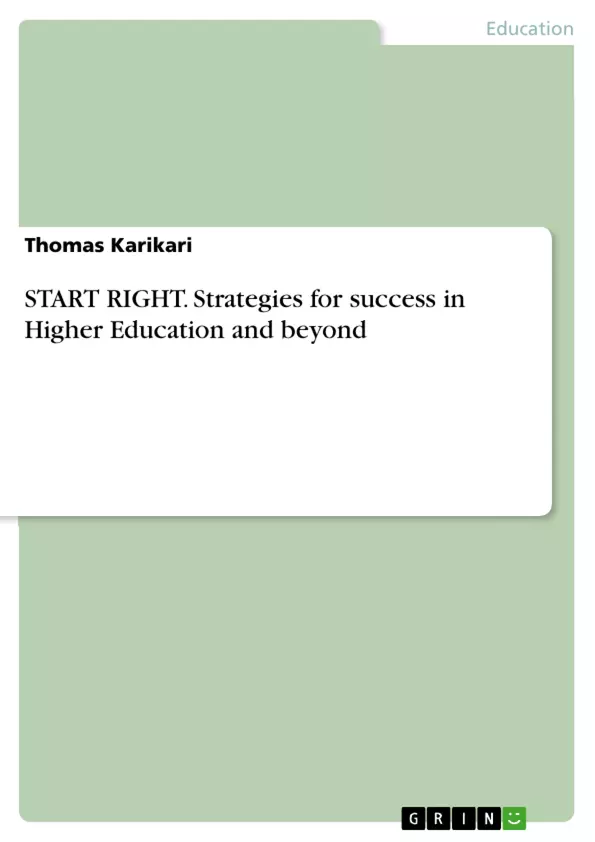FOREWORD
It is the ultimate aspiration of every student to attain higher heights. Most of us want to further our education to higher levels. But it is sad to know that not all students are able to climb that high. Some lag behind along the way due to a myriad of reasons. You therefore must be proud of yourself for surmounting all obstacles and challenges to come this far. You are an achiever! However, you need to be aware that as you go higher, the difficulties become stronger. You will be confronted with challenging issues such as; the new style of teaching; getting along with new people; coping with stress; personal, financial and time management.
As an academician, I have realised from my many years of experience that lots of students lack the basic rules of success in the classroom and beyond. This unfortunate development is, at least partly, to be blamed on the absence of good reading material that covers all aspects of student life. I therefore accepted with great joy, the honour from Thomas to foreword this wonderful book. One thing I like about the book is that it presents material in a practical, easy-to-read format for all kinds of students. I urge you to take absolute advantage of all the useful tips the book provides so as to develop your capabilities and potentials to become an outstanding student.
The central message of the book is to equip you with the practical principles and strategies to be successful as a student. It takes you through major issues of student life, including; ways of getting along with others, effective ways of learning and note-taking, preparation for exams, time and stress management, personal financial management, dating and relationships, etc. START RIGHT provides you with the systematic framework to develop learning and problem-solving attitudes that work effectively both in and outside the classroom. This will help you to start your career right and end it right.
Prof. I. K. Dontwi
Dean, Institute of Distance Learning
Kwame Nkrumah University of Science and Technology
Kumasi, Ghana
Inhaltsverzeichnis (Table of Contents)
- Foreword
- Acknowledgement
- Introduction
- Chapter 1: The Right Start
- Chapter 2: Getting Along With Others
- Chapter 3: Effective Ways of Learning and Note-taking
- Chapter 4: Preparation for Exams
- Chapter 5: Time and Stress Management
- Chapter 6: Personal Financial Management
- Chapter 7: Dating and Relationships
- Conclusion
Zielsetzung und Themenschwerpunkte (Objectives and Key Themes)
This book aims to provide students with practical strategies for achieving success in higher education and beyond. The author draws on personal experiences and observations to offer guidance on various aspects of student life, covering topics like effective learning, time management, and personal development.
- Developing effective learning habits and study skills.
- Managing time and stress effectively.
- Building healthy relationships with peers and instructors.
- Managing finances and making informed decisions.
- Preparing for exams and navigating academic challenges.
Zusammenfassung der Kapitel (Chapter Summaries)
- Chapter 1: The Right Start discusses the importance of setting goals, identifying strengths and weaknesses, and developing a positive mindset for success in higher education.
- Chapter 2: Getting Along With Others explores the dynamics of interpersonal relationships in a university setting, offering advice on building connections, communicating effectively, and resolving conflicts.
- Chapter 3: Effective Ways of Learning and Note-taking provides practical strategies for efficient information processing, including active listening, note-taking techniques, and time management for studying.
- Chapter 4: Preparation for Exams offers guidance on preparing for exams, such as developing effective study plans, managing anxiety, and utilizing different learning styles.
- Chapter 5: Time and Stress Management provides insights into time management principles and techniques for reducing stress levels. It covers prioritizing tasks, setting realistic goals, and developing healthy coping mechanisms.
- Chapter 6: Personal Financial Management offers practical tips for managing personal finances as a student, including budgeting, saving, and making informed financial decisions.
- Chapter 7: Dating and Relationships explores the complexities of dating and relationships in a university environment, providing advice on navigating these aspects of personal life while pursuing academic goals.
Schlüsselwörter (Keywords)
This book focuses on topics such as higher education, student success, academic achievement, personal development, relationship building, stress management, time management, financial management, and effective learning strategies. It provides practical guidance for students to excel in their academic pursuits while developing essential life skills for success beyond the classroom.
Frequently Asked Questions
What is the central message of "START RIGHT"?
The book aims to equip students with practical principles and strategies to be successful both in their academic life and in their future careers.
What are some of the challenging issues students face in higher education?
Students often struggle with new teaching styles, coping with stress, interpersonal relationships, and managing time and personal finances.
Does the book offer advice on study techniques?
Yes, Chapter 3 is dedicated to effective ways of learning and note-taking, while Chapter 4 focuses on preparation for exams.
Is financial management covered in the book?
Yes, Chapter 6 provides practical tips for personal financial management specifically tailored for students.
Who wrote the foreword for the book?
The foreword was written by Prof. I. K. Dontwi, Dean of the Institute of Distance Learning at KNUST, Ghana.
- Citation du texte
- Thomas Karikari (Auteur), 2014, START RIGHT. Strategies for success in Higher Education and beyond, Munich, GRIN Verlag, https://www.grin.com/document/271994



